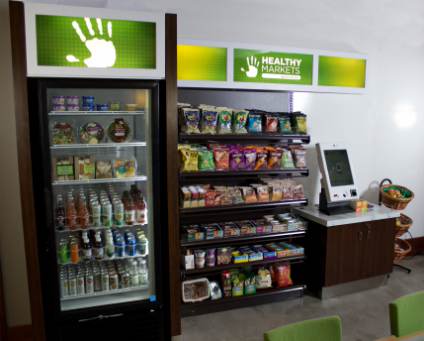H.U.M.A.N. Aims to Make Snacking Healthy
In this Salute to American Success, we’re taking a look at HUMAN Healthy Vending and founder and CEO Sean Kelly. HUMAN, which stands for “Helping Unite Mankind and Nutrition”, says on its website it “uses vending machines, unattended self-checkout convenience stores and direct delivery services to bring healthier, better-for-you foods and drinks to people in the most convenient manner possible.” Despite facing some obstacles early on, Kelly turned the company around, and was included in Forbes Magazine’s 30 Under 30 list in 2013.
EARLY LIFE
Sean Kelly grew up in Traverse City, Michigan, known to many as the “Cherry Capital of the World.” When he was a senior in high school, Kelly made the decision to study biomedical engineering. Despite being a huge Michigan sports fan, he decided to head to the East Coast for college, with his first stop being Johns Hopkins University in Baltimore. After studying at Hopkins, Kelly transferred to Columbia University in New York City, where he stayed in the pre-med program.
After receiving his undergrad at Columbia, Kelly decided not to pursue his dream of becoming a cardiothoracic surgeon.
“In my senior year I told my parents I was not going to go to medical school,” said Kelly. “I wanted to focus on preventative nutrition and public health, and they were fully supportive.”
Kelly eventually became a personal trainer, working with clients in New York City. His idea for HUMAN came after seeing a woman (who was working out) purchase a 20 ounce Coca-Cola from a vending machine at a gym in the Upper West Side of Manhattan.
“There was no good reason why there were no healthy vending machines,” said Kelly. “People will eat what’s put in front of them. Hyper convenient access is absolutely not going away. That’s why I said I don’t know how I’m going to do this, but vending machines can be used to make it happen.”
Five years later, in 2008, Kelly, along with Andy Mackensen, founded HUMAN. In the first two to three years of the business, Kelly and his business partner invested roughly “a few hundred thousand dollars” in the company. However, he found himself having trouble with money.
“I had hundreds of thousands of credit card debt in the business,” said Kelly. “We didn’t even pay ourselves for a couple years.”
The company also faced problems with their new vending machines.
“A whole bunch of our first 50 high-tech machines were not working properly in the field,” said Kelly. “That almost ended the business right there.”
Then, with the help of a friend who was willing to share a big bonus he just received at his job, and a new sales strategy, Kelly said he was able to work himself and the company out of debt.
THE COMPANY TODAY
Since its inception in 2008, besides selling vending machines, HUMAN has ventured into a new medium- “micro markets,” which are essentially mini, self-checkout convenience stores found in offices. While HUMAN builds the machines and markets, the products they sell are made by outside companies.
“We want customers to trust that HUMAN will bring them the best, healthiest products,” said Kelly. “The healthy micro markets are our large focus right now. We want to reinvent the break room.”
In 2014, HUMAN reported “a little over $6 million” in vending revenue, according to Kelly. This year, the company and its franchises have grown to serve more than 2,000 micro-markets and vending machines in offices, schools, YMCAs and health clubs, in more than 40 states, Canada and Puerto Rico. HUMAN also has more than 200 franchises across the U.S.
ADVICE TO OTHER ENTREPRENEURS
Kelly’s biggest piece of advice to future entrepreneurs focuses on the decision making processes that occur within every business.
“Don’t be so concerned with whether or not the choice you’re making is the right one,” said Kelly. “Success doesn’t come with just that one decision. Success comes from how you react to that decision.”
Looking back, Kelly reflected on some of the mistakes he made and which ones business owners should avoid.
“I wish I would have surrounded myself with very experienced mentors sooner rather than later,” said Kelly.




















